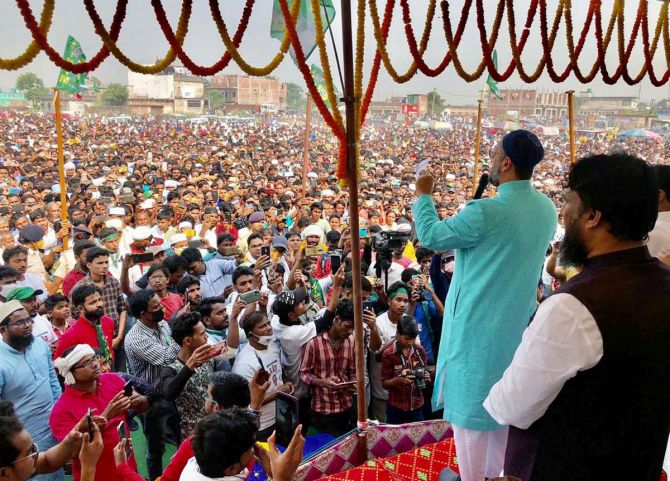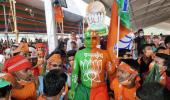Owaisi's five seats in Bihar's Muslim-majority Seemanchal region ought to ring alarm bells, observes Virendra Kapoor.

Media commentary on the Bihar outcome exaggerates the role and potential of Rashtriya Janata Dal leader Tejashwi Yadav and underplays the performance and questionable potential of All India Majlis-e-Ittahudal Muslimeen leader Asaduddin Owaisi.
And while doing so, it fails to sufficiently factor in the long anti-incumbency, migrants's travails, lack of economic opportunities, stagnation in development that the Janata Dal-United-Bharatiya Janata Party combine faced -- and still managed to retain power.
But Tejashwi first.
One major factor in favour of the Mahagathbandhan was that it had the good sense to rope in the Left parties under its all-embracing umbrella.
CPI-M General Secretary Sitaram Yechury might bask in the reflected glory of the spectacular performance of the Communist parties, which among them bagged 19 of the 27 seats allocated, but it was the untiring grassroots work of the CPI-ML in organising the weaker sections which helped the CPI-M and the CPI piggyback their way into the assembly.
The CPI-ML's 12 out of 19 was the best strike rate in the poll.
By accommodating the Communists, the alliance acquired a certain ideological sheen, diluting its 'jungle raj' image.
Left parties had small pockets of influence in many more constituencies.
If Tejashwi moved away from the usual caste-based campaign to 'Roji-Roti' issues the credit goes to CPI-ML leader Dipankar Bhattacharya.
CPI-ML cadres have been active organising the poor in the most backward districts, challenging local landlords and petty bureaucrats.
The Communists may have won 19 seats, but they helped attract the youth vote for the Mahagathbandhan in several other constituencies.
The truth is that this was an election for Tejashwi to lose.
When the exit polls predicted a victory for the Mahagathbandhan, these merely reflected the general mood in the state which had most visibly turned its back on Chief Minister Nitish Kumar.
Why the 'Sushasan Babu' of yesteryears had become so unpopular was hard to explain.
But after giving roads, drinking water, electricity, cycles to girl schoolchildren, etc., people now demanded more.
The expectations had grown. They wanted jobs which Nitish failed to create.
His promise to re-industrialise Bihar -- at the time of Independence Bihar was industrially ahead of most states -- failed to materialise.
No big industry had been established in Nitish's 15 years in power.
Following the Bihar result, the over-the-top encomiums paid to Tejashwi as a future leader who could well challenge Modi at the national level in 2024 shows more the desperation of the liberal-leftist cabal than his actual leadership potential.
The same Tejashwi as deputy chief minister had forced Nitish Kumar to eat crow and go back to the BJP which he had dumped to sup with the jungle raj party.
Nitish stated that he was forced to dump the RJD due to corruption by its ministers.
Those going ga-ga over Tejashwi as a leader of a nationwide grand alliance allow their animus against Modi to get the better of their judgment.
Let us now come to a more worrisome significance of the Bihar outcome.
The political class will ignore at its own peril the slow but inexorable rise of the All India Majlis-e-Ittehadul Muslimeen in Muslim-dominated parts of the country.
Its leader Asaduddin Owaisi -- a clever lawyer, articulate and proficient in English and Urdu, and reasonably wealthy, traits he shares with Jinnah -- encourages his co-religionists to support a party which is against the secular-liberal ethos of this country.
Not unlike the Muslim League of pre-Partition days, when it had swept Muslim-majority constituencies in the provincial elections, strengthening the Jinnah claim that the Congress was a 'Hindu party,' Owaisi's five seats in Bihar's Muslim-majority Seemanchal region neighbouring Nepal ought to ring alarm bells.
From being confined to the former Razakar-dominated Hyderabad region, the AIMIM's emergence in recent years as evidenced by its gains in Maharashtra, Bihar, and its growing vote share in Muslim pockets in UP should be a matter of concern.
The truth is Hindus do not feel obliged to vote for the BJP.
But a vast majority of Muslims feel obliged to vote only as Muslims first and Muslims last.
This explains why Muslim voters elected five nominees of Owaisi, passing an opportunity to boost the Mahagathbandhan's strength in the state assembly.
Ensuring the BJP's defeat came second for a self-avowedly Muslim party.
Between Tejashwi Yadav and Asaduddin Owaisi, it had to be Owaisi in Kishanganj which has an over 70 percent Muslim population.
Meanwhile, the disastrous performance of the Congress party which won only 19 of the 70 seats allocated by the Mahagathbandhan -- by the way, the Communists won 19 of 29 -- has attracted insufficient focus.
The tweet-a-day Congress leader proved such a dud that since the Bihar outcome he has not been heard leveling a fresh charge against Modi.
His party performed disastrously not only in Bihar, but in UP, Gujarat, MP and Karnataka, where in the 53 by-elections the BJP came out victorious in 41 seats.
As a Congress leader said rather colourfully, 'khota sikka bhi kabhi, kabhi chal jata hain, par Hamara Rahul hamesha hi fail hai.'
But for a moment don't think there is a link between Rahul Gandhi's electoral performance and the chances of his becoming president of the Congress party.
The Congress is a family heirloom, how the Gandhis destroy it is, and shall remain, 'only' their business.
The so-called organisational process now underway is a sham.
Eventually, Rahul Gandhi alone will replace his mother as the party chief.
The 23 letter writers can eat their hearts out, the Gandhis will not relax their vice-like grip of the family firm.
Not even the Bihar rejection will make them do the right thing by the party and step aside for some other younger and more promising leader, say, a Sachin Pilot, to step forward.
No way. The Congress shall live and die with the Gandhis.
Feature Presentation: Aslam Hunani/Rediff.com











 © 2025
© 2025